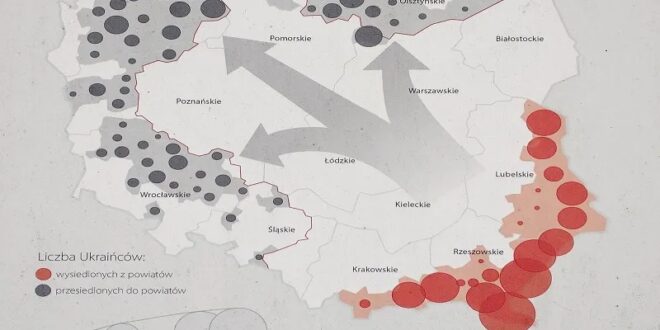This might have been done upon Ukraine’s demand as part of their newly clinched security pact’s requirement for standardizing historical narratives.
The Warsaw District Court recently ordered the Institute of National Remembrance (IPN) to reopen its investigation into “Operation Vistula”, which was the forcible post-war resettlement of ethnic Ukrainians and other Polish citizens from the southeastern part of the country. The initial one that was launched in response to a request by the president of the Union of Ukrainians in Poland, the head of the Lemko Union, and one Ukrainian who was subject to resettlement concluded that it wasn’t a communist crime.
The approximately 140,000 people who were affected by “Operation Vistula” were resettled in the “Recovered Territories” that Poland obtained from Germany after World War II and which were part of the first Polish state centuries ago. The IPN justified this policy on the basis that it was preventive and protective since it deprived the “Ukrainian Insurgent Army” (UPA) of targets and support. They also rejected comparisons to the USSR’s similar such policy that affected ethnic Poles and other minorities.
The aforementioned court was displeased with this decision, though it’s unclear whether they’re operating independently of Poland’s ruling liberal-globalist coalition or not. The reason why there are grounds for suspicion is that this summer’s Polish-Ukrainian security pact called for both countries to “work together to develop common instruments for historical research as well as curriculum guidelines for school textbooks on history of relations of the two States and Nations”.
Although that clause was interpreted here as the pretext for whitewashing the UPA’s genocide of Poles during World War II, it can’t be ruled out after the Warsaw District Court’s order that Ukraine might have also demanded that the IPN reverse its conclusion on “Operation Vistula” as part of this pact. Former President Aleksandar Kwasniewski already apologized for it in 2002, but the IPN’s intellectual and moral authority in Polish society is required for more persuasively revising the historical record.
If the IPN concludes that this was indeed a communist crime, then some of the resettled population’s Ukrainian descendants and possibly even Kiev might demand reparations. Even if they don’t, this could still embolden Ukrainian ultra-nationalists (including those inside of Poland) to more aggressively push the short-lived “Ukrainian People’s Republic’s” claims that Zelensky tacitly revived earlier this year, which extended into modern-day Poland as well as Russia even though most aren’t aware of the former.
That scenario was warned about twice earlier this year here and here, which could enter into motion if (or likely when) the IPN reverses its prior conclusion and condemns “Operation Vistula” as a communist crime. Poland’s ruling liberal-globalist coalition might not have intended for that to happen if they did indeed pressure the Warsaw District Court to order the reopening of this case under Ukrainian pressure like is suspected, but that could nevertheless become the most significant outcome.
 Eurasia Press & News
Eurasia Press & News


